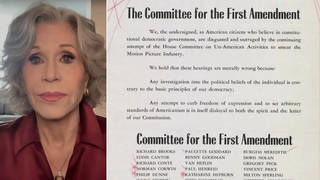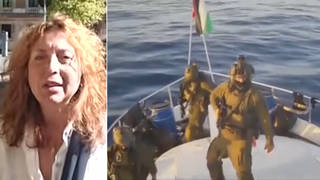
Guests
- Bill McKibbenauthor, educator, environmentalist and founder of the anti-fossil fuel organization 350.org as well as Third Act.
- Svitlana RomankoUkrainian climate activist and environmental lawyer who lives in the western Ukrainian city of Ivano-Frankivsk and founded the Stand with Ukraine campaign.
A new report from the United Nations Intergovernmental Panel on Climate Change warns the opportunity to mitigate the worst effects of global warming by maintaining global temperatures at 1.5 degrees Celsius is quickly closing and that humanity has less than three years to slash greenhouse gas emissions. “Fossil fuel is at the root of our problems. It is at the root of the despotisms we see in Russia or in Saudi Arabia or indeed the Koch brothers’ efforts to deform our own democracy,” says Bill McKibben, environmentalist and founder of 350.org. It is time to demand world leaders sign a fossil fuel nonproliferation treaty, says Ukrainian climate activist Svitlana Romanko. Romanko is also with the Laudato Si’ Movement, which exists to implement the second encyclical of Pope Francis about “care for our common home” and recognizes the war in Ukraine has been funded by fossil fuels. Pope Francis says he plans to visit Ukraine, and Romanko says his “leadership may create a difference in this war.”
More from this Interview
- Part 1: Making a Killing: Big Oil Reaps Record Profits Using Ukraine War as Pretext to Hike Gas Prices
- Part 2: Europe Buys $38B in Russian Energy Since Invasion; 30% of the Gas Comes Via Pipelines in Ukraine
- Part 3: Bill McKibben: Latest IPCC Climate Report Underscores “Fossil Fuel Is at the Root of Our Problems”
Transcript
AMY GOODMAN: I wanted to go to the new U.N. report that just came out, the United Nations warning Monday humanity has less than three years to slash greenhouse gas emissions nearly in half in order to prevent the most catastrophic effects of the climate crisis. In this major new report, scientists with the U.N.’s Intergovernmental Panel on Climate Change, the IPCC, find that without immediate and dramatic action, it will be impossible to limit global temperature rise to 1.5 degrees Celsius above pre-industrial levels. U.N. Secretary-General António Guterres said the report documents a litany of broken climate promises by nations.
SECRETARY-GENERAL ANTÓNIO GUTERRES: It is a file of shame, cataloging the empty pledges that put us firmly on track towards an unlivable world. We are on a fast track to climate disaster — major cities underwater, unprecedented heat waves, terrifying storms, widespread water shortages, the extinction of a million species of plants and animals. And this is not fiction or exaggeration. It is what science tells us will result from our current energy policies.
AMY GOODMAN: I want to get both of your actions to this climate report, beginning with Bill McKibben, getting lost, to say the least, in the top news of Russia’s war on Ukraine. But the significance of this and how it directly connects to the war?
BILL McKIBBEN: Well, yeah, I mean, first of all, it’s not as if there’s something brand new in what they said, but what’s new is the tone. I mean, every time the IPCC issues another report, we’re further down this road without having done anything. And it was quite interesting, Amy, to listen to António Guterres, the secretary-general. This man is the top diplomat on the planet, so he’s used to speaking in diplomatic language. He has abandoned that. He’s also the one guy whose political jurisdiction is the whole Earth, and he’s clearly scared.
He said, among other things — I thought this was maybe the most important, and I think Svitlana will agree, because of the amazing work she’s been doing on banks. He said, “At this point it is economically and morally insane to continue new investment in the development of fossil fuels.” And yet, last week we also saw the release of this new report showing that the biggest U.S. banks are doing just that, which is why at Third Act we’ve got this pledge to get people to, at year’s end, cut up their credit cards from Citi and Chase and Wells Fargo and BofA if they haven’t changed.
But that report reminds us that fossil fuel is at the root of our problems. It is at the root of the despotisms we see in Russia or in Saudi Arabia or indeed the Koch brothers’ efforts to deform our own democracy. And it’s also at the root of the biggest existential challenge that we’ve ever faced. Remember, it was late last month when we watched temperatures in the Antarctic climb to 70 degrees Fahrenheit above normal. That’s a horror that connects so deeply with what’s going on in the Ukraine, and they both need to scare us to the, really, core of our beings.
AMY GOODMAN: And, Svitlana, if you can respond, and if you can see this moment, this horror in your own country that’s taking place, as a time when the world turns to renewable energy?
SVITLANA ROMANKO: Absolutely, yes. And I also do think that so far it’s very good that governments imposed the sanctions on all new investments into Russia. But I think they need to go further and look into their own countries and impose all internal bans in the investments in new fossil fuel projects and, more than that, seize all investments from existing fossil fuel projects. And divestment plays a critical role, from private funds, from public funds available. It plays a critical role, as 10 years ago as for now.
And finally, I would say that we, as a movement, consider that it’s time to increase the pressure on world leaders, on CEOs, stakeholders, banks, financial institutions. And we call upon the various of actions, which will be on April 22nd and early May, May 8th and May 16th, just to call to end the war in Ukraine but also end the war on nature and the war on people. We call for all global climate justice solidarity and for peace. Please join our call to action and join our mobilization call to make a difference.
AMY GOODMAN: Last quick question, Svitlana: You’re with Laudato Si’, the movement, which is medieval Central Italian for “Praise be to you.” It is a Catholic group. Your group is formerly known as the Global Catholic Climate Movement. Pope Francis has said he may come to Ukraine. That also, Laudatory Si’, refers to pope’s encyclical on the climate crisis, the subtitle, “On Care for Our Common Home.” Can you talk about the significance of his possible trip?
SVITLANA ROMANKO: It’s very significant, because we, as the Laudato Si’ Movement, we exist to implement Laudato Si’ encyclical, which has the integral ecology approach, that everything is interconnected. And Laudato Si’ Movement also recognizes the fact that the war in Ukraine has been funded by fossil fuels. And Pope Francis’ leadership may create a difference in this war, and it alone may support an end war in Ukraine if there would be enough of leadership around the visit, I believe.
And we are also for a fossil fuel nonproliferation treaty, which I believe the Vatican Dicastery of Promoting Integral Human Development recognized that one of the important ways how we can overcome climate crisis, ecological crisis and crisis of peace, and get finally peace and get social justice. So, probably we will collaborate more around fossil fuel nonproliferation treaty, and all global leaders join in this treaty, and the countries where the Catholic movement is active for now, as well. And, of course, Laudato Si’ encyclical teaches us to take care of all creation. And now the creation has been under the major destruction. I believe the pope will take this significant step, and we will assist him if he decides to visit the massacred Bucha and all other Kyiv suburbs that suffered the most. We are grateful for this gesture.
AMY GOODMAN: Svitlana Romanko, I want to thank you for being with us, Ukrainian climate activist and longtime environmental lawyer. Thank you for joining us from Ukraine, from western Ukraine. And please be safe. Bill McKibben, author, environmentalist, founder of Third Act and 350.org, co-founder. They wrote the Los Angeles [Times] op-ed piece together, “The Ukraine war is a decision point — banks should stop funding the fossil fuel industry forever.” We’ll link to that piece. Bill joining us from Middlebury, Vermont.
Next up, we look at the reelection of Hungary’s far-right nationalist prime minister. Stay with us.











Media Options